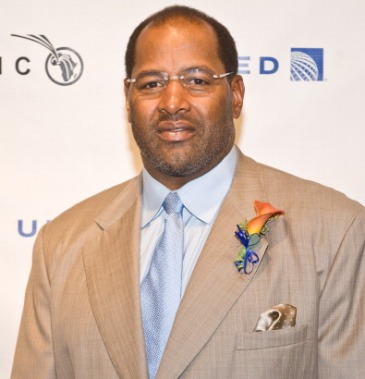Lawsuit Alleges NFL Illegally Supplied Players With Drugs
By Chuck Sudo in News on May 20, 2014 7:30PM

NFL Hall of Famer Richard Dent (pictured) is one of the plaintants in the class action lawsuit. (Timothy Hiatt/Getty Images)
A group of former National Football League players have accused the league of illegally supplying them and others with addictive painkillers and drugs during their playing careers that numbed their injuries so they could play games and led to health complications after their careers were over.
The players contend in the class-action lawsuit filed in U.S. District Court in San Francisco the NFL obtained these drugs illegally, without prescriptions, didn’t alert players to the potential side effects of the drugs, and in many cases players were not told of broken bones they suffered in order to get them back onto the playing field. The eight players named as plaintiffs in the lawsuit include three members of the 1985 Super Bowl Champion Chicago Bears: Jim McMahon; Keith Van Horne; and Richard Dent.
The accounts of the former players are nearly all identical in nature. Here’s some from Dent’s.
While playing in the NFL, Mr. Dent received hundreds, if not thousands, of injections from doctors and pills from trainers, including but not limited to NSAIDs and Percodan. No one from the NFL ever talked to him about the side effects of the medications he was being given or "cocktailing" (mixing medications). Over the course of his career, Mr. Dent became dependent on painkillers, a slow process that overtook him without him being cognizant of it happening. After his career ended, he was no longer able to obtain painkillers from the NFL and was forced to purchase over-the-counter painkillers to satisfy his need for medications. Over the course of that time, he has spent an extensive amount of money on such medications.
McMahon alleges he played through a broken ankle he believed was originally a sprain and suffered a broken neck, yet continued playing in a 1993 playoff game.
While playing in the NFL, Mr. McMahon received hundreds, if not thousands, of injections from doctors and pills from trainers, including but not limited to NSAIDs such as Toradol, Percocet, Novocain injections, amphetamines, sleeping pills and muscle relaxers. No one from the NFL ever talked to him about the side effects of the medications he was being given or cocktailing. Over the course of his career and 18 surgeries, Mr. McMahon became dependent on painkillers, a slow process that overtook him without him realizing it. At one point, he was taking as many as 100 Percocets per month, even in the off-seasons. After his playing career concluded, he was no longer able to obtain painkillers for free from the NFL and was forced to purchase over-the-counter painkillers to satisfy his need for medications. Over the course of that time, he has spent an extensive amount of money on such medications.
Van Horne was dressed down by former Bears trainer Fred Caito for obtaining a Percodan subscription from a non-team physician.
When Van Horne told Caito that a physician had prescribed the drug, Caito responded that was not the problem. The problem was that the Bears ordered painkillers before the season started under players' names, including Van Horne's. Van Horne had thus put Caito in a bad spot by obtaining the Percodan because there were already DEA records that hundreds of painkillers had been ordered in Van Horne's name, even though Van Horne had no need for the medications the Bears had ordered at the time the order was placed.
The suit alleges the players were also given uppers to prepare for games and downers to help relax and sleep. This lawsuit comes nearly two years after former players filed a class-action lawsuit against the league claiming it hid the links between playing football and brain injuries from them. The league settled that lawsuit last August for $765 million.
To this day the “warrior” culture of playing through pain still exists in the NFL. HBO’s Real Sports with Bryant Gumbel in 2012 looked at the use of the pain killer Toradol in the NFL. Former Chicago Bear Brian Urlacher was interviewed for the segment and famously expressed nonchalance about receiving injections of the drug, which has been linked to kidney failure and gastrointestinal bleeding.
”It’s normal. You drop your pants … they give you the shot, they put on a band-aid and you go out and play.”
Urlacher also said during the segment he would lie about a concussion if it meant staying on the field during a game.